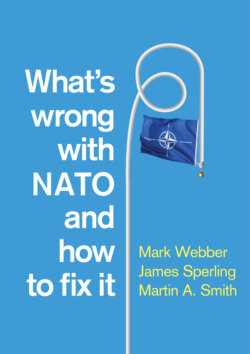Читать книгу What's Wrong with NATO and How to Fix it - Mark Webber - Страница 17
Notes
Оглавление1 1. Christian Whiton, ‘NATO Is Obsolete’, The National Interest, 6 July 2018, https://nationalinterest.org/feature/nato-obsolete-25167.
2 2. Mary Dejevsky, ‘Donald Trump Is Right about One Thing: NATO Is Obsolete’, The Independent, 7 April 2016, https://www.independent.co.uk/voices/donald-trump-right-about-one-thing-nato-obsolete-a6973231.html.
3 3. Interviewed in The Economist, 7 November 2019, https://www.economist.com/europe/2019/11/07/emmanuel-macron-warns-europe-nato-is-becoming-brain-dead.
4 4. Jochen Bittner, ‘Does NATO Still Exist?’, New York Times, 7 July 2016, https://www.nytimes.com/2016/07/08/opinion/does-nato-still-exist.html.
5 5. Jonathan Clarke, ‘Replacing NATO’, Foreign Policy, No. 93, 1993–4, pp. 22–40.
6 6. ‘The Future of NATO: NATO Flexes Its Muscle Memory’, The Economist, 30 August 2014, https://www.economist.com/international/2014/08/30/nato-flexes-its-muscle-memory.
7 7. Ian Bremmer, ‘The Hollow Alliance’, Time, 27 June 2016, https://time.com/4371195/nato-transatlantic-alliance-us-europe/.
8 8. Elizabeth Pond, Friendly Fire: The Near-Death of the Transatlantic Alliance (Washington, DC: Brookings Institution Press, 2004).
9 9. Cited in Thom Shanker and Steven Erlanger, ‘Blunt US Warning Reveals Deep Strains in NATO’, New York Times, 10 June 2011, http://www.nytimes.com/2011/06/11/world/europe/11nato.html.
10 10. Jens Ringsmose and Mark Webber, ‘No Time to Hedge? Articulating a European Pillar within the Alliance’, NATO Defence College, Policy Brief, No. 5, 2020, http://www.ndc.nato.int/news/news.php?icode=1423.
11 11. ‘Çavuşoglu: Turkey Will Consider Exit from NATO’, Katehon, 10 August 2016, https://katehon.com/news/cavusoglu-turkey-will-consider-exit-nato.
12 12. BBC News, 7 May 2019, https://www.bbc.co.uk/news/av/world-europe-48189096/iceland-s-green-pm-jakobsdttir-on-nato-membership.
13 13. Roger Cohen, ‘Anti-Semitic Anti-Zionism’, New York Times, 18 October 2016, https://www.nytimes.com/2016/10/19/opinion/anti-semitic-anti-zionism.html.
14 14. Ted Galen Carpenter, ‘NATO Is an Institutional Dinosaur’, War on the Rocks, 25 August 2016, https://warontherocks.com/2016/08/nato-is-an-institutional-dinosaur/.
15 15. Wallace J. Thies, Why NATO Endures (Cambridge etc.: Cambridge University Press, 2009), p. 296.
16 16. Kori Schake, ‘NATO after the Cold War, 1991–1995: Institutional Competition and the Collapse of the French Alternative’, Contemporary European History, 7(3), 1998, p. 381.
17 17. Carl Cavanagh Hodge, ‘Full Circle: Two Decades of NATO Intervention’, Journal of Transatlantic Studies, 11(4), 2013, pp. 350–67.
18 18. James Sperling, ‘Introduction: A Stable Crisis? NATO into the Twenty-First Century’, in James Sperling and S. Victor Papacosma (eds), NATO after Sixty Years: A Stable Crisis (Kent, OH: The Kent State University Press, 2012), p. 1.
19 19. Celeste A. Wallander, ‘Institutional Assets and Adaptability: NATO after the Cold War’, International Organization, 54(4), 2000, pp. 705–35.
20 20. Seth A. Johnston, How NATO Adapts: Strategy and Organization in the Atlantic Alliance since 1950 (Baltimore: Johns Hopkins University Press, 2017), pp. 118–75.
21 21. Brian C. Rathbun, Trust in International Cooperation: International Security Institutions, Domestic Politics and American Multilateralism (Cambridge etc.: Cambridge University Press, 2011), pp. 1–23, 163–208.
22 22. This idea was conceived originally by Karl Deutsch and colleagues in Political Community in the North Atlantic Area (Princeton: Princeton University Press, 1957), which is the source of the quotation (p. 5).
23 23. Patricia A. Weitsman, Waging War: Alliances, Coalitions, and Institutions of Interstate Violence (Stanford: Stanford University Press, 2014), p. 190.
24 24. We borrow here from Kenneth W. Abbott, Jessica F. Green and Robert O. Keohane, ‘Organizational Ecology and Institutional Change in Global Governance’, International Organization, 70(2), 2016, pp. 247–77.
25 25. Munich Security Conference Report 2020: Westlessness, https://securityconference.org/assets/user_upload/MunichSecurityReport2020.pdf.
26 26. Vincent Pouliot, International Pecking Orders: The Politics and Practice of Multilateral Diplomacy (Cambridge etc.: Cambridge University Press, 2016), pp. 86–116.
27 27. Jamie Shea, ‘NATO at Full Stretch’, International Politics Reviews, 4, 2016, pp. 36–42.
28 28. John J. Mearsheimer, ‘The False Promise of International Institutions’, International Security, 19(3), 1994/1995, p. 7.
29 29. Michael N. Barnett and Martha Finnemore, ‘The Politics, Power, and Pathologies of International Organizations’, International Organization, 53(4), 1999, pp. 699–700.
30 30. Robert O. Keohane and Lisa L. Martin, ‘The Promise of Institutionalist Theory’, International Security, 20(1), 1995, pp. 39–51.
31 31. Ivan Krastev and Stephen Holmes, The Light that Failed: A Reckoning (London: Allen Lane, 2019); Stephen Walt, ‘The Global Order after COVID-19’, Institute for Security Policy, Vienna, Working Paper, 2020.
32 32. Robert O. Keohane, ‘International Organization and the Crisis of International Interdependence’, International Organization, 25(2), 1975, pp. 357, 359.
33 33. Hugh Miall (ed.), Redefining Europe: New Patterns of Conflict and Cooperation (London and New York: Pinter Publishers, 1994).
34 34. Edward Newman, A Crisis of Global Institutions? Multilateralism and International Security (London and New York: Routledge, 2007), p. 21.
35 35. See, for instance, Julian Lindley-French, NATO: The Enduring Alliance 2016 (Warsaw: Foundation for Polish–German Cooperation, 2016); R.N. Burns and J.L. Jones, Jr, Restoring the Power and Purpose of the NATO Alliance (Washington, DC: Atlantic Council 2016); J.R. Deni, NATO and Article 5: The Transatlantic Alliance and the Twenty-First-Century Challenges of Collective Defence (Lanham, MD: Rowman and Littlefield, 2017); John Andreas Olsen (ed.), Future NATO: Adapting to New Realities (Whitehall Paper 95) (London: Royal United Services Institute, 2020).
